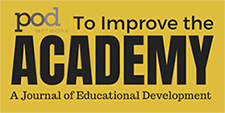Professional and Organizational Development Network in Higher Education

To Improve the Academy: A Journal of Educational Development
Date of this Version
2001
Document Type
Article
Citation
To Improve the Academy: A Journal of Educational Development (2001) 19; http://dx.doi.org/10.3998/tia.17063888.0019.015
Abstract
Just as the last thing a fish would notice is water, academics tend to overlook the value of a comprehensive course syllabus. It seems too prosaic for some instructors to take seriously. Despite operating largely in obscurity, a nascent body of literature appreciative of the syllabus’ latent potential is emerging. The distinguishing features of model syllabi are traced here, and their respective benefits analyzed. First and foremost, good syllabi enhance student learning by improving the way courses are taught. But the potential of syllabi can also be tapped by using them more prominently in the faculty evaluation process. Much slower to develop has been an awareness of how exemplary syllabi can forge substantive links among three curricular levels of the academy often proceeding randomly: individual courses, programs of study at the departmental level, and general studies requirements at the institutional level. The assessment movement now sweeping American higher education can broaden its analytical base by recognizing the exemplary syllabus as a rare fulcrum uniting each of the three academic levels pursuing institutional mission statements.
Included in
Curriculum and Instruction Commons, Higher Education Commons, Higher Education Administration Commons, Higher Education and Teaching Commons, Other Education Commons


Comments
License: CC BY-NC-ND